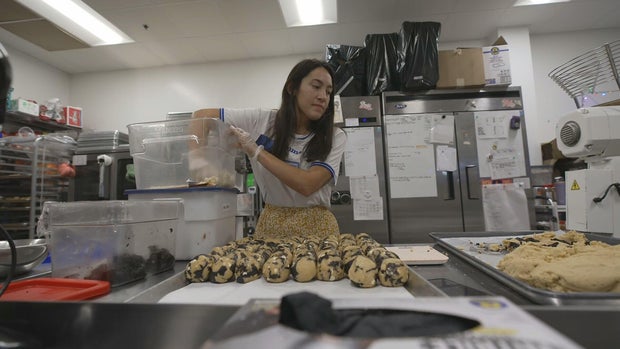Cristina Rojas, who became a U.S. citizen in March, says she has temporarily closed The Batchmaker, the bakery she owns in Charlotte, North Carolina, fearing for her community’s safety amid the Trump administration’s immigration crackdown.
“I became a citizen but I don’t stop being Honduran. I don’t stop being Hispanic,” Rojas told CBS News. “The fact that a paper tells me you’re now a citizen of this country doesn’t take away from the fact that I look the way I look.”
Rojas said her family’s safety outweighs her economic concerns. She is taking the closure day by day, only doing pick-up service for customers who have long-standing preorders.
“I think there’s going to be a huge loss, but I don’t think that there’s a price I am willing to pay to risk it,” Rojas said.
More than 200 people have been arrested since Friday, when the Department of Homeland Security launched what it’s calling “Operation Charlotte’s Web.” Immigration enforcement agents also moved into the Raleigh, North Carolina, area on Tuesday, with DHS maintaining it’s targeting the “worst of the worst.”
“I see myself through the people that have been detained,” Rojas told CBS News.
“I see myself through the people that are being terrorized and not able to go to work and school,” she added. “So while, yes, I am a citizen, it doesn’t take away from who I am, where I was born, and what makes me, and I am Hispanic. I am an immigrant.”
Across Charlotte, students have staged walkouts to protest the immigration enforcement. Officials for Charlotte-Mecklenburg Schools said more than 30,000 students, roughly 22% of the entire district, were absent on Monday.
North Carolina Gov. Josh Stein criticized Border Patrol’s tactics Tuesday, saying they don’t promote public safety.
“If this were targeted to going after known people who are criminals or known people who are drug traffickers who are engaged in violent crime, that would be a good thing, but they’re just sweeping sidewalks, they’re sweeping parking lots,” Stein said. “They’re going into stores and churches. This is causing widespread fear, widespread uncertainty. This is not about public safety, and I wish that it were.”

